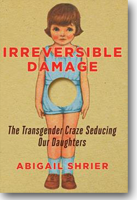Kerby Anderson provides an overview of the transgender craze that has taken over the western world in the past ten years, drawing on startling insights from Abigail Shrier and Ryan Anderson.
Transgenderism is the belief that people have a “gender identity” that is distinct from their sex. If they feel there is a conflict between their gender and their sex, gender identity should take precedence. Although a very small fraction of the population may experience gender dysphoria, the current percentage of Americans identifying as transgender or nonbinary has exploded.
Gender Dysphoria Research
 Abigail Shrier wrote about the transgender craze in her book Irreversible Damage: The Transgender Craze Seducing Our Daughters. When she joined me on my Point of View radio program, she explained that “gender dysphoria” was characterized by severe and persistent discomfort in one’s biological sex. It typically begins in early childhood. In previous generations, it afflicted a sliver of the population (roughly .01 percent) and occurred mostly in boys.
Abigail Shrier wrote about the transgender craze in her book Irreversible Damage: The Transgender Craze Seducing Our Daughters. When she joined me on my Point of View radio program, she explained that “gender dysphoria” was characterized by severe and persistent discomfort in one’s biological sex. It typically begins in early childhood. In previous generations, it afflicted a sliver of the population (roughly .01 percent) and occurred mostly in boys.
Prior to 2012, there was no scientific literature on girls (11-21) ever having developed gender dysphoria at all. Then the Western world experienced a sudden surge of adolescents claiming to have gender dysphoria and self-identifying as “transgender.”
In 2016, Lisa Littman (an ob-gyn, public health researcher) was scrolling through social media when she noticed a statistical peculiarity. Several adolescents (most of them girls) from a small town in Rhode Island had come out as transgender. In fact, they were all from the same friend group.
She admitted that she knew very little about gender dysphoria, but this statistical anomaly was interesting to her. And she then noticed there had been a sudden spike in the western world of girls experiencing gender dysphoria. She immersed herself in the scientific literature on gender dysphoria to try to understand what was happening. Perhaps it was due to increased social acceptance of LGBTQ people, but she suggested in a peer-reviewed paper that the girls might be rushing toward “transition” because of peer contagion. As you might imagine, her suggestion was roundly criticized. She was also accused of anti-trans bigotry.
In a subsequent research project, she collected data anonymously from 256 parents whose kids had not met the criteria of gender dysphoria in childhood, but suddenly identified as transgender in adolescence. She identified 16 traits in common. Here are a few.
• The vast majority have zero indicators of childhood gender dysphoria.
• Almost a third of them did not seem at all gender dysphoric.
• A majority had one or more psychiatric diagnosis and almost half were engaged in self-harm prior to the onset of dysphoria.
• Nearly 70 percent of the teenagers belonged to a peer group in which at least one friend had also come out as transgender.
• Among parents who knew their children’s social status, over 60 percent said the announcement brought a popularity boost.
• Over 88 percent of the parents surveyed reported being supportive of transgender rights.
How to Respond to the Transgender Moment
 Ryan Anderson is the author of the book, When Harry Became Sally: Responding to the Transgender Moment. He explains how transgender ideology promotes the opportunity for children to change their gender with surgery and drugs. And parents “are told that puberty blockers and cross-sex hormones may be the only way to prevent their children from committing suicide.”
Ryan Anderson is the author of the book, When Harry Became Sally: Responding to the Transgender Moment. He explains how transgender ideology promotes the opportunity for children to change their gender with surgery and drugs. And parents “are told that puberty blockers and cross-sex hormones may be the only way to prevent their children from committing suicide.”
Ryan Anderson countered that the best studies of gender dysphoria have found “that between 80 and 95 percent of children who express a discordant gender identity will come to identify with their bodily sex if natural development is allowed to proceed.” He also documented that even children going through “transitioning” treatment still have an extraordinarily high rate of suicide attempts compared to the general population.
He reminded us that we should be tolerant and loving toward children (and adults) who struggle with their gender identity. But we should also be aware of the potential harm when transgender identity is normalized.
Unfortunately, we are living in a world where transgender activists want more than tolerance and kindness. They demand affirmation. We aren’t allowed to question whether using medical treatments to aid in transgender transformation is positive for children. In his book, Ryan Anderson shows that the best biology, psychology, and philosophy support an understanding of sex as a bodily reality. As he puts it: “Biology isn’t bigotry.”
Abigail Shrier also offers several suggestions. First, don’t get your kid a smartphone. She explains that nearly every problem teenagers face traces itself back to the introduction of the smartphone years ago.
Second, don’t relinquish your authority as a parent. You don’t have to go along with every idea your teenager has, nor do you have to go along with every educational or psychological fad being promoted in society.
Third, don’t support gender ideology in your child’s education. She provides an example of what happens when schools do a seminar on anorexia or suicide. Often the prevalence increases. A small number of students may have gender confusion or gender dysphoria. But talking about it will spread confusion.
Finally, don’t be afraid to admit that it’s wonderful to be a girl.
While she talks about the benefits and opportunities of being a girl, Christians can go even further. We believe God is responsible for who we are and what we are. Each one of us is created in God’s image (Genesis 1:26). We can celebrate girls and boys and encourage them to use their gender and their gifts to the glory of God (1 Corinthians 1:31).
©2023 Probe Ministries